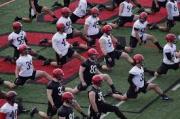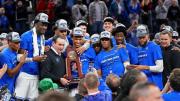Gene Therapy: Then You Don't Love Football

by: Gene Clemons
While most media members ignored it or tried to paint a narrative that nobody was paying attention, the USFL just completed their first season. That culminated over July 4th weekend when the Birmingham Stallions defeated the Philadelphia Stars in the USFL Championship held in Canton Ohio. Fox Sports president Eric Shanks did not allow any speculation to begin when he announced last week that the USFL will return next season. The ratings have been steady throughout the season. Games averaged over a million viewers on Fox and NBC. Even when you add in the cable network games on USA Network and FS1 the averages were still 715,000. Those numbers were better than the NHL, Premier League and MLS in this country. All three of those entities people will argue with you that there is an appetite for those sports but not for Spring football.
The question is why? Why are so many in the media lying to sports fans; pretending as if there is no appetite for football in the spring? The answer may actually shock you. Too many people who work in football don't love football!
The idea might be difficult to understand as a sports fan, but the truth is like every other job, writers, broadcasters, and content creators get burned out and they are accustomed to the offseason to provide them with the necessary time to recharge the batteries. Interesting enough, most people who love their jobs don't need months away from it to feel rejuvenated. Usually all I need is a few days off from writing or creating content and I am right back ready to work. So, the idea of Spring football was fantastic for me. When the FCS decided to move their 2020 season to Spring 2021, I seemed to be the only journalist in the country excited about it and who truly believed that could be a permanent decision for them. Everyone else thought it would be a disaster. Nobody really pointed to anything significant except logistics.
I love sports and more specifically I love football. One of the reasons I believe I don't get burned out on the game is because I love the game. I have heard many people including those in the business say things like "I love the NFL" or "I love college football" but I like it all. Youth league, high school, college, flag, women's, and every professional league out there, including foreign leagues, offer something to learn or study about the game. Many journalists don't invest in the intricacies of the game, they invest in storylines that can be regurgitated. But, like anything you have grown to truly love, you are always finding new things to love about it. That is what sustains you when you can't lean on the things that normally fuel your attraction. How can you ever love something you don't truly understand? How can you remain in love with something you only know at a superficial level?
Another thing that shows up when people who cover the sport for a living don't want to invest in new leagues is that the grind to build up the sports fan's sustained attention is real. Football fans have been burned so many times before with leagues that did not last for many reasons but ultimately because the investment was not there for the ownership, sponsors and of course the media. Fans need the investment from the other stakeholders before they will truly invest. That means if media entities and journalists don't regularly produce content on the league, if they don't tweet or post about it, then how will the football fan who doesn't know much about the league find information about it. Most fans have their trusted outlet, journalists or creator that they follow for their sport's information. So, if those people or entities do not spread the word, how can the interest spread.
The social media buzz began to rise over the past few weeks as more people happened upon the games. The response seemed to be pretty universal "These are some fun games." Watching as various football writers or creatives woke up and remembered that football was being played once they were not focused on NFL non-padded OTA and voluntary minicamps was funny. But the built-in attention that NFL content gets makes them want to grab the low hanging fruit. But the chance to expand the game of football is one that should never be overlooked or avoided because it may not get as many clicks, initially. As a football fan more football is never a bad thing, especially if it is fun. Ultimately, that's all you can ask for; right? Entertainment is the purpose, so as long as a league can be entertaining, then football fans will definitely invest in it.
There's value in being a pioneer. People always remember the "day one's" those that invested before it was fashionable. The fact that so many media coverage outlets didn't even bother to try and cover the USFL is sad. In days long past now, the media was charged with exposing the community at large to new endeavors and once the information was properly disseminated, the people could make an informed decision about whether they wanted to continue to consume it.
I was excited to see the USFL accomplish something the XFL was not able to in its initial return or the AAF in their failed attempt at a league. I was willing to be critical about the areas where the league came up short and I gave them their props on the things they hit out of the park. I was even willing to admit I was wrong about the things I did not believe would work. That's all a part of loving this game and wanting to see it consistently expand and improve. There is more to football than the NFL and major college programs. More athletes deserve to be highlighted and more have earned the right to play the game we love professionally and be paid a good living wage to do so. The debate about the appetite for Spring football is over. A hunger was fulfilled and there will only be more to eat next year. It is time for sport's media to do their part. Start cooking.
###
Gene Clemons is a Sports Analyst and Contributor to CWN Sports. His weekly column and podcast - Gene Therapy focuses on Sports, Politics and Social/Urban issues.
Read more









